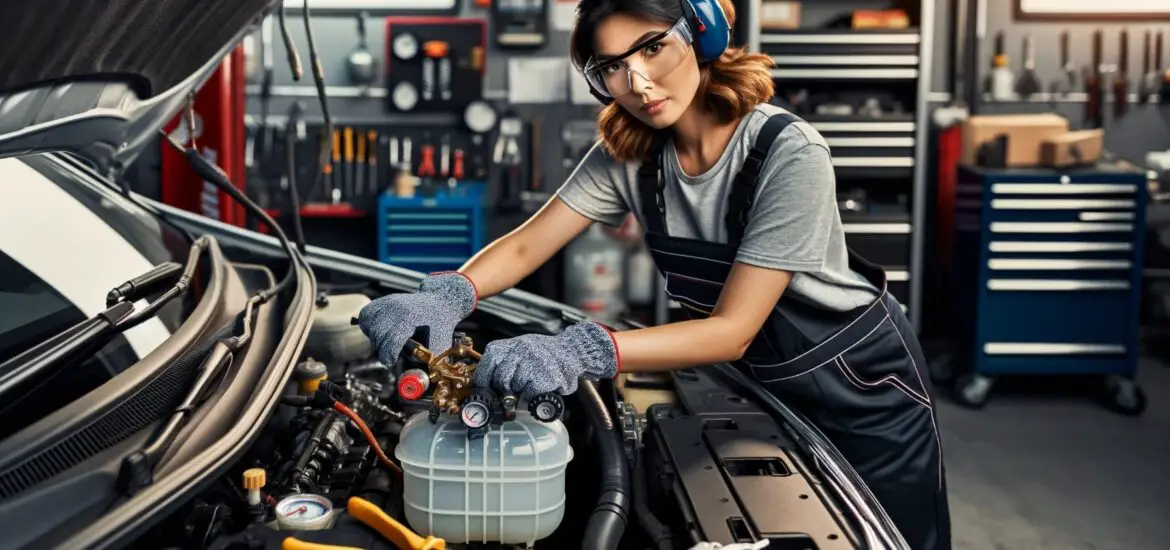This detailed guide will walk you through Freon overcharge symptoms in a car, why they happen, and how to address them effectively.

Table of Contents
Freon Overcharge Symptoms in a Car
Identifying freon overcharge in your car’s AC system is key to preventing damage. The main Freon overcharge symptoms in a car include:
Reduced Cooling Efficiency
Too much freon disrupts the cooling cycle, leading to poor performance. This means the air blowing from your AC may be warmer than expected. Or the system may take longer to cool the interior of your car. This reduced efficiency is a clear indicator that the balance of freon in the system is off.
Noises from the AC Compressor
An overcharged system can cause the AC compressor to work harder than it’s designed to. This usually leads to unusual noises. These can range from mild buzzing to loud grinding sounds, indicating mechanical stress or potential damage to the compressor.
AC Clutch Not Engaging
The AC clutch is responsible for engaging and disengaging the compressor. An overcharge can lead to high pressure in the system, preventing the clutch from engaging properly. This results in the compressor not operating, halting the refrigerant circulation. In turn, the AC’s ability to cool is impaired.
Visible Leakage
An overcharged system creates excessive pressure, potentially causing the refrigerant to leak from seals or hoses. These leaks might appear as oily spots near the AC components. This can lead to refrigerant loss and environmental harm.
High System Pressure Readings
When a professional mechanic uses a manifold gauge set like this BENTISM AC Manifold Gauge Set 3-Way Fit to check the pressure. An overcharged system will show higher than normal readings. This is a direct indication of too much freon and can be used to diagnose the issue accurately.
Causes of Freon Overcharge
Several factors can contribute to a freon overcharge in your car’s AC system:
Incorrect Servicing: One of the most common causes of freon overcharge is improper servicing. This usually happens when technicians add more freon than the manufacturer’s specified amount, often due to inattention or lack of familiarity with the specific requirements of your car’s model.
Lack of Proper Tools: Servicing the AC system without the appropriate tools, such as a correctly calibrated gauge for measuring refrigerant levels, can lead to inaccurate freon quantities being added.
Inexperience: Individuals attempting to service their own AC systems without proper training or experience may inadvertently overcharge the system. Understanding the specific freon requirements and how to accurately measure them is crucial for maintaining the system’s balance.
Diagnosing Freon Overcharge
Proper diagnosis of a freon overcharge involves a few key steps:
Visual Inspection: A professional mechanic will start with a visual inspection of the AC system, looking for signs of leakage or damage that could indicate an overcharge.
Pressure Testing: The most definitive way to diagnose freon overcharge is through pressure testing using a manifold gauge set. The mechanic will connect the gauge to the AC system’s service ports and read the pressure levels. If these levels are significantly higher than what is recommended by the car’s manufacturer, it confirms an overcharge.
Performance Testing: Assessing the cooling performance of the AC system can also provide clues. If the system is underperforming despite being filled recently, it might suggest an overcharge condition.
Fixing a Freon Overcharged Car AC
Correcting a freon overcharge involves a specific process:
Refrigerant Recovery: The first step is to safely remove the excess freon. This is done using a refrigerant recovery machine, which ensures that the freon is removed safely and in an environmentally responsible manner.
This BENTISM Portable 1 HP Refrigerant Recovery Machine is available at Walmart.
System Evaluation: After the excess freon is removed, the mechanic will check the AC system for any damage that might have occurred due to the overcharge. This includes inspecting the compressor, hoses, and seals for signs of stress or leakage.
Correct Refill: Once any issues are addressed, the mechanic will refill the system with the correct amount of freon, adhering strictly to the manufacturer’s specifications. This ensures optimal performance and prevents future overcharge issues.
Preventing Freon Overcharge in the Future
To prevent future freon overcharge, consider the following tips:
Professional Servicing: Always entrust your car’s AC servicing to certified professionals. They have the expertise and equipment to correctly service the system.
Regular Maintenance: Scheduling regular maintenance checks allows for early detection and correction of improper freon levels, as well as other potential issues.
Owner Awareness: Familiarize yourself with the basics of your car’s AC system. Knowing the signs of potential problems, including freon overcharge, can help you seek timely professional help.
